Post-Truth: Can I Be Sure about the 2016 Word of the Year?

I listened in disbelief. This latest news couldn’t possibly be true – could it?
I did a little research. Apparently, it is true. At least I think it is true. It has been reported as true. I’m still wondering, though, if it truly is true.
Here’s the headline that I found on the website of The Washington Post:
‘Post-truth’ named 2016 word of the year by Oxford Dictionaries
Post-truth? What in the world is that?
Thankfully, the website provided this information:
The dictionary defines “post-truth” as “relating to or denoting circumstances in which objective facts are less influential in shaping public opinion than appeals to emotion and personal belief.”
So – facts and objective truths are out, but feelings and personal beliefs are in. Is that it? Are you sure that’s it? How do you feel about that being it? What do you believe about that being it?
It seems that, in a “post-truth world,” something may be truth to me, but not truth to you. In fact, it appears to be the case that I cannot be confident about my own “truth.”
After all; my mood may have changed since I decided that a certain thing was true. Maybe it was true then because I felt good about it. Maybe it is not true now because I no longer feel that way.
Another possibility might be that I have read, seen, or heard something that makes me question and/or change my personal belief about a matter. That would have a major impact on my “truth.”
Maybe I should go back to the first career I had as an adult. All I would need to do in a “post-truth” high school history classroom would be to keep some semblance of order. After all, if one of my students believed that the Japanese attack on Pearl Harbor started the American Revolutionary War, who am I to tell him that his/her “truth” is not accurate? If that student, for some reason, had a deep emotional attachment to our southern states, could I expect him/her to accept the fact that The Confederacy lost the Civil War?
Wait! What if one of those students truly believed that he/she should be the teacher of that class? What if that person felt like he/she was the teacher instead of me? I guess, at that point, I should just turn in my resignation and find something else to do with my time.
Let’s review:
- The Washington Post (and many other sources) reported that Oxford Dictionaries chose “post-truth” as the 2016 word of the year.
- “Post-truth” means that I must believe something to be the case and/or have a positive emotion about something in order for it to be truth to me.
So…
- Is it true that Oxford Dictionaries chose “post-truth” as 2016’s word of the year?
- Is it true that The Washington Post reported that?
- Is it true that The Washington Post even exists?
- Is it true that Oxford Dictionaries even exists?
I serve the One who said very clearly, “…I am the way, the truth, and the life. No man comes to the Father except by Me” (John 14:6, emphasis added).
I live in a nation founded by men who wrote these words to explain why they were disassociating themselves from England: “We hold these truths to be self-evident…”
I think I’ll let the post-modern people live by their post-truth “truths.” I prefer to hold fast to things that are factual, verifiable, and logical.
To Receive Every Post from A Legacy of Faith through Email for Free, Click Here
Photo background credit: Mike Licht on Creative Commons



